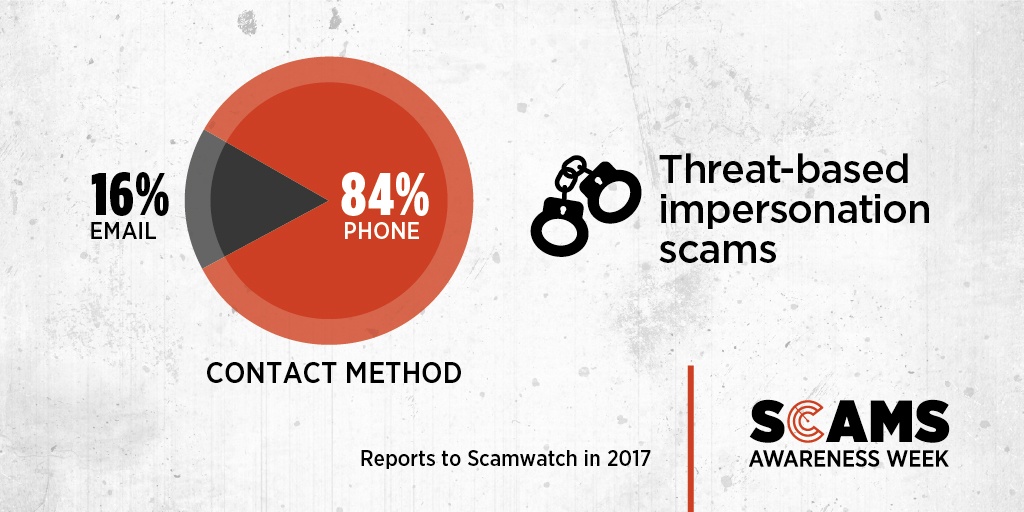If you received a call out of the blue from the Tax Office saying you had a tax debt that you had to pay immediately or be arrested, what would you think? If Telstra called you and said there were internet problems in your area and they needed remote access to your computer in order to help you otherwise they would disconnect your service, what would you do?
While it would be understandable if your initial reaction might be fear or panic, this Scams Awareness Week, Australians are being urged to ‘Stop and check – is this for real?’
These calls are examples of threat-based impersonation scams, about which the ACCC’s Scamwatch received almost 33,000 reports in 2017. About 85 per cent of these reports indicated the scammer had been in contact by telephone.
In these scams, scammers pretend to be from a government agency or well-known, trusted business and use threats to pressure or scare you into giving them money or your personal information. They may threaten that you will receive a fine, that you will be charged additional fees, that your internet will be disconnected, that the police or debt collectors will come to your home, or that you will be taken to court, arrested or even deported.
These scammers and their threats can seem genuine and frightening. They make you feel as if you’ve done something wrong or that there’s some urgency and you must do what they say immediately or suffer the consequences.
And many people have believed these threats. According to Scamwatch, over $4.7 million was reported lost and more than 2800 people gave their personal information to these scammers in 2017.
Older Australians have been particularly vulnerable to these scams – people aged 65 and over submitted more than 5800 of the Scamwatch reports and reported losing almost $1 million last year.
If you’re contacted unexpectedly and threatened by someone that says they’re from a government agency or trusted business, always consider the possibility that it may be a scam – then stop and check if it’s for real.

Keep in mind the following tips to protect yourself:
- Verify the identity of the contact through an independent source, such as a phone book or online search, then get in touch with them to ask if they contacted you. Don’t use the contact details provided by the caller or in the message sent to you.
- Never send money, give your banking or credit card details or other personal information to anyone you don’t know or trust, and never by email or over the phone.
- Know that a government agency or trusted business will never ask you to pay them with gift or store cards, iTunes cards, wire transfers or Bitcoin.
- Don’t open suspicious texts, pop-up windows or click on links or attachments in emails – just delete them. These could infect your computer with malware.
- Never give anyone remote access to your computer if they’ve contacted you out of the blue – whether through a phone call, pop up window or email – and even if they claim to be from a well-known company like Telstra.
But if you realise you’ve lost money or given your personal details to a scammer, there are steps you can take straight away to limit the damage and protect yourself from further loss:
- If you’ve sent money or shared your banking or credit card details, contact your financial institution immediately. They may be able to stop or reverse a transaction, or close your account.
- If you’ve given your personal information to a scammer, visit IDCARE, Australia and New Zealand’s not-for-profit national identity and cyber support service. IDCARE can work with you to develop a specific response plan to your situation and support you through the process.
- As scammers are often based overseas, it is extremely difficult for government agencies to track them down or for law enforcement to take action against them. So take the time to warn your friends and family about these scams.
For more information about these scams, where to get help or to report a scam, visit the Scamwatch website here.
About the Scams Awareness Network (SAN)
Since 2011, the ACCC, as chair of the Australasian Consumer Fraud Taskforce (now known as the Scams Awareness Network or SAN) has led a major annual scams awareness campaign, the National Consumer Fraud Week (now known as Scams Awareness Week). This year’s campaign focuses on threat-based impersonations and will run from Monday 21 to Friday 25 May 2018. For more information visit scamwatch.gov.au




















